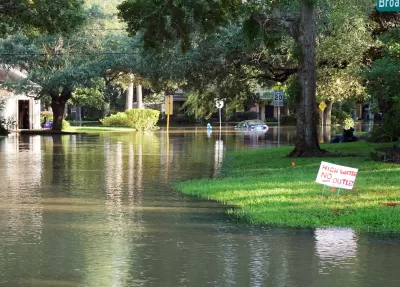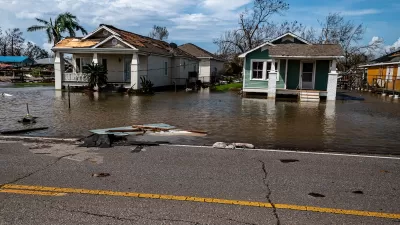Recent extreme flooding along the San Jacinto River has prompted a review of the progress of Harris County’s flood-prone home buyout program.

The site of the United States’s “longest-running experiment in the adaptation policy known as ‘managed retreat’” experienced extensive flooding last week when severe rainstorms dropped months’ worth of rain on Houston in just a few days, reports Jake Bittle in an article for Grist. Over the past decade, “Harris County has spent millions of dollars buying out and demolishing at-risk homes along the [San Jacinto River],” where some of the deepest flooding happened. According to Bittle, “the past week’s flooding has demonstrated that even this nation-leading program hasn’t been able to keep pace with escalating disaster.
Over the past thirty years, the county has bought around 600 at-risk homes along the waterway, but still has another 1,600 on its list, along with the challenges of uncertain funding and reluctant property owners. Houston is no stranger to property buy-outs. Bittle reports that Harris County was one of the first local governments in the country to buy out flood-prone homes with federal money, and his article details the county’s various efforts—and struggles—over the years. Perhaps the biggest challenge is, even if recent flooding has convinced all the homeowners in the area it is time to leave, the program doesn’t currently have enough money to make it happen.
Buyout programs to relocate homeowners are certainly a better alternative to rebuilding over and over again — and likely less costly in the long run. But as Houston’s program shows us, without proper funding they cannot keep pace with the increasingly severe weather events and sea level rise caused by climate change.
FULL STORY: Texas flooding brings new urgency to Houston home buyout program

Alabama: Trump Terminates Settlements for Black Communities Harmed By Raw Sewage
Trump deemed the landmark civil rights agreement “illegal DEI and environmental justice policy.”

Planetizen Federal Action Tracker
A weekly monitor of how Trump’s orders and actions are impacting planners and planning in America.

Why Should We Subsidize Public Transportation?
Many public transit agencies face financial stress due to rising costs, declining fare revenue, and declining subsidies. Transit advocates must provide a strong business case for increasing public transit funding.

Understanding Road Diets
An explainer from Momentum highlights the advantages of reducing vehicle lanes in favor of more bike, transit, and pedestrian infrastructure.

New California Law Regulates Warehouse Pollution
A new law tightens building and emissions regulations for large distribution warehouses to mitigate air pollution and traffic in surrounding communities.

Phoenix Announces Opening Date for Light Rail Extension
The South Central extension will connect South Phoenix to downtown and other major hubs starting on June 7.
Urban Design for Planners 1: Software Tools
This six-course series explores essential urban design concepts using open source software and equips planners with the tools they need to participate fully in the urban design process.
Planning for Universal Design
Learn the tools for implementing Universal Design in planning regulations.
Caltrans
Smith Gee Studio
Institute for Housing and Urban Development Studies (IHS)
City of Grandview
Harvard GSD Executive Education
Toledo-Lucas County Plan Commissions
Salt Lake City
NYU Wagner Graduate School of Public Service





























